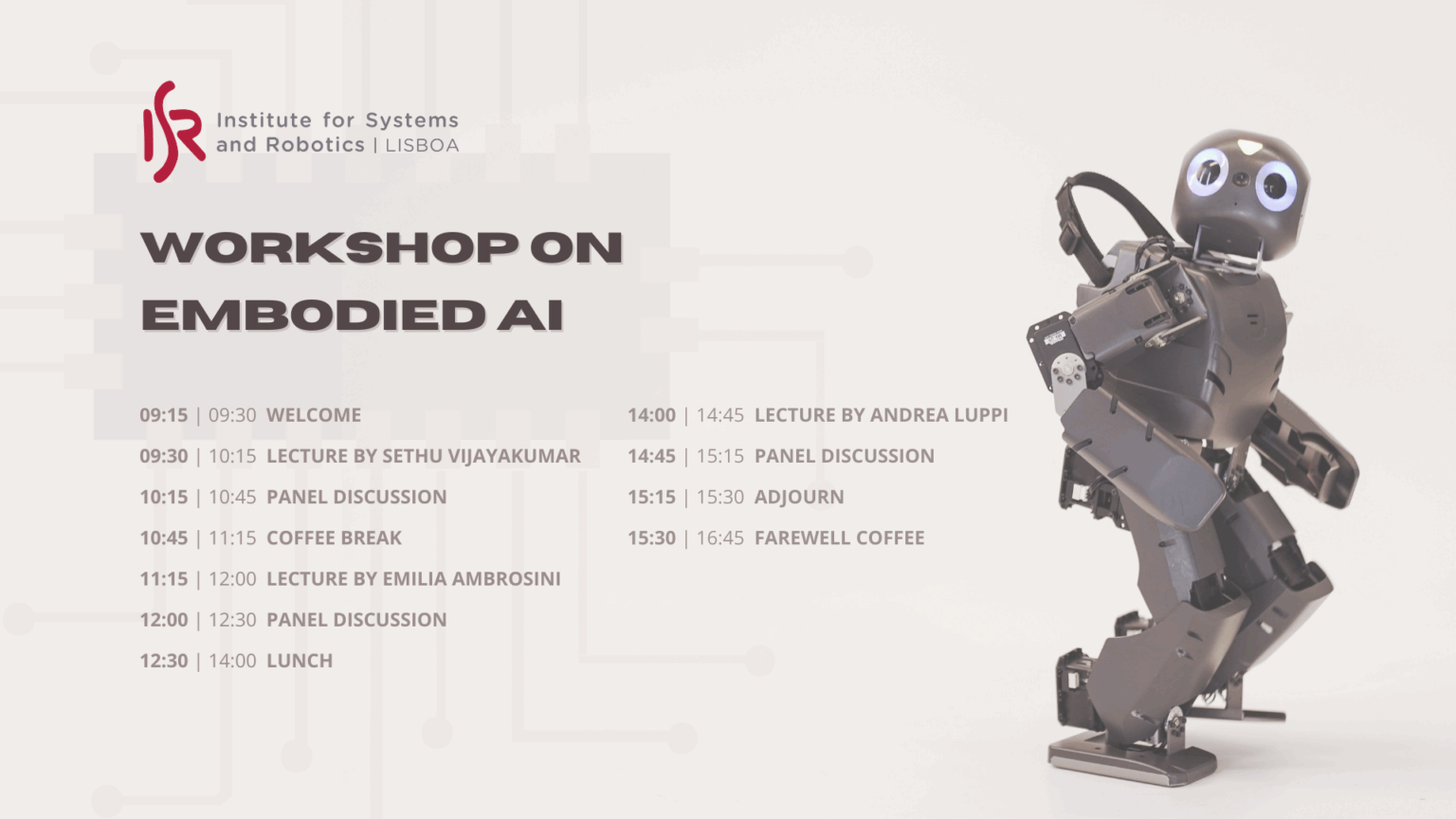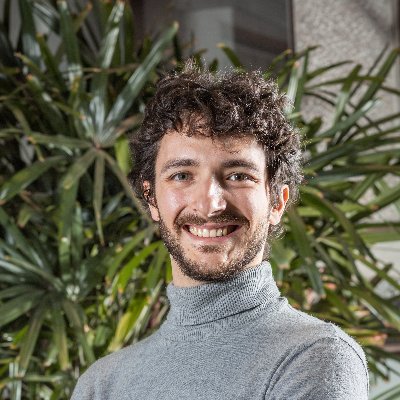First ISR-Lisboa Workshop on Embodied AI | Brains, Bodies, and Machines: Interdisciplinary Perspectives on Embodied Intelligence
September 25, 2025
ABREU FARO AUDITORIUM

Workshop Goals
ISR-Lisboa core research integrates artificial intelligence and its applications to real-world challenges. One of its key areas of focus is the bilateral relationship between neurosciences and robotics. This involves not only developing more intelligent neuro-inspired robot systems, but also exploring how robotics can be utilized to test certain neuroscientific concepts and models. This workshop, which will take place on September 25th, represents a significant step towards uniting these two research communities. The objective is to foster the discovery of ground-breaking results and inspire students, researchers, and faculty to pursue novel research avenues.
FULL PROGRAMME
SESSION 1 | Moderator: Pedro Lima
09:15 | 09:30 Welcome
09:30 | 10:15 Sethu Vijayakumar – “From Automation to Autonomy: Embodied Generative AI driving the Future of Work”
The use of AI and Robotics in our society is becoming ubiquitous and inevitable across various walks of life. The new generation of robots work much more closely with humans, other robots and interact significantly with the environment around it. As a result, the key paradigms are shifting from isolated decision-making systems to one that involves shared control — with significant autonomy devolved to the robot platform; and end-users in the loop making only high-level decisions. This talk will provide a glimpse into the powerful machine learning technologies ranging from robust multi-modal sensing, shared representations, scalable real-time learning and adaptation, and compliant actuation that are enabling us to reap the benefits of increased autonomy while still feeling securely in control – with focus on latest algorithmic and hardware developments. This also raises some fundamental questions: while the robots are ready to share control, what is the optimal trade-off between autonomy and control that we are comfortable with? Domains where this debate is relevant include deployment of robots in surgical interventions, extreme environments, self-
driving cars, asset inspection, repair & maintenance, factories of the future and assisted living technologies including exoskeletons and prosthetics to list a few.
10:15 | 10:45 Panel discussion – Isabel Ribeiro, Plinio Moreno, Sérgio Pequito, Andrea Luppi, Emilia Ambrosini and Sethu Vijayakumar
10:45 | 11:15 Coffee break
SESSION 2 | Moderator: José Santos-Victor
11:15 | 12:00 Emilia Ambrosini – “Neuromuscular Electrical Stimulation and robotics: two complementary approaches to foster motor re-learning”
Hybrid robotic systems, which combine Neuromuscular Electrical Stimulation (NMES) with robotic devices, have recently emerged as a promising approach to overcoming the limitations of each technology when used in isolation. By enabling personalized interventions, these systems have the potential to significantly enhance therapeutic outcomes, especially when combined with the subject’s residual volitional capabilities. In my talk, I will first introduce the neurophysiological principles of NMES and its primary therapeutic effects. I will then discuss the key advantages and challenges of hybrid NMES-robotic systems. Finally, I will review various control strategies proposed in the literature, with a special focus on personalized solutions developed over the past 15 years at the Neuroengineering and Medical Laboratory of Politecnico di Milano.
12:00 | 12:30 Panel discussion – Rodrigo Ventura, Thanos Vourvopoulos, Pedro Batista, Andrea Luppi, Emilia Ambrosini and Sethu Vijayakumar
12:30 | 14:00 Lunch
SESSION 3 | Moderator Patrícia Figueiredo
14:00 | 14:45 Andrea Luppi – “A synergistic network architecture for human brain evolution and cognition”
How does the organization of neural information processing enable humans’ sophisticated cognition? In this talk I will outline how we decompose the interactions between regions of the brain into synergistic and redundant components, revealing their distinct information-processing roles in the human brain. Synergistic interactions instead support integrative processes and complex cognition across higher-order brain networks. The human brain leverages synergistic information to a greater extent than nonhuman primates, with high-synergy association cortices exhibiting the highest degree of evolutionary cortical expansion. Finally, I will show how the same synergistic core is also affected by pathological and pharmacological perturbations of consciousness, demonstrating fragility as the dark side of synergy.
14:45 | 15:15 Panel discussion – Joana Cabral, João Sanches, Alexandre Bernardino, Andrea Luppi, Emilia Ambrosini and Sethu Vijayakumar
15:15 | 15:30 Adjourn
15:30 | 16:45 Farewell coffee
Invited Speakers
Emilia Ambrosini
Associate Professor, Bioengineering Department and Neuroengineering and Medical Robotics Laboratory, Politecnico di Milano, IT
Emilia Ambrosini is Associate Professor at Politecnico di Milano. She received her Master’s Degree cum laude in Biomedical Engineering from Politecnico di Milano in 2007 and her PhD degree com laude in Bioengineering in 2011. Since 2011, she carried on her research activity at NearLab (Neuroengineering and Medical Robotics Laboratory) and she has been involved in several national (FESleg and FeatherExo; INAIL – Centro Protesi; Active3, Fondazione Cariplo; HYBR-ID, PRIN Project) and international projects (MUNDUS, EU-FP7 ICT; RETRAINER, H2020 IA ICT; MOVECARE, H2020 ICT; ESSENCE, H2020 IA; NIH Biofeedback for CP; i3LUNG, HORIZON EU; iBeChange, HORIZON EU). Her research focuses on developing innovative methods for functional electrical stimulation and robotic systems to aid rehabilitation, daily life assistance, and sports for neurological patients. She also works on methods and algorithms for quantitatively assessing rehabilitative interventions and for ecological monitoring, disease diagnosis, and screening. Since 2019, she is team manager of the POLIMI FES-bike team at CYBATHLON. She is co-authors of more than 60 papers in international journals indexed in Scopus (H-index 30, Sept 2025). She teaches the class of Biomedical Instrumentation (Bachelor in Biomedical Engineering) and the laboratory class of Functional Evaluation Laboratory (Master in Biomedical Engineering).
Sethu Vijayakumar
Professor of Robotics, University of Edinburgh; Programme Director at The Alan Turing Institute, UK
Sethu Vijayakumar is the Professor of Robotics at the University of Edinburgh, UK, Fellow of the Royal Society of Edinburgh and the Founding Director of the Edinburgh Centre for Robotics. He has pioneered the use of large-scale machine learning techniques in the real-time control of several iconic robotic platforms such as the SARCOS and the HONDA ASIMO humanoids, KUKA-LWR robot arm and iLIMB prosthetic hand. One of his projects (2016) involved a collaboration with NASA Johnson Space Centre on the Valkyrie humanoid robot being prepared for unmanned robotic pre-deployment missions to Mars. Professor Vijayakumar, who has a PhD from the Tokyo Institute of Technology, holds the Royal Academy of Engineering (RAEng) – Microsoft Research Chair at Edinburgh and is also an Adjunct Faculty of the University of Southern California (USC), Los Angeles. He has published over 250 peer-reviewed and highly cited articles [H-index 51, Citations > 13,500 as of 2025] on topics covering robot learning, optimal control, and real-time planning in high dimensional sensorimotor systems. He is a judge on BBC Robot Wars and winner of the 2015 Tam Dalyell Prize for excellence in engaging the public with science – including his role in the UK wide launch of the BBC micro:bit initiative (2016) for STEM education. Professor Vijayakumar helps shape and drive the national Robotics and Autonomous Systems (RAS) agenda in his role as a Programme Director (AI) at The Alan Turing Institute, the United Kingdom’s national institute for data science and Artificial Intelligence.
Andrea Luppi
Welcome Early Career Fellow, University of Oxford & Research Fellow, St John’s College, Cambridge, UK
Andrea Luppi is a Wellcome Early Career Fellow at the University of Oxford, and Fellow of St John’s College Cambridge. Prior to his current position he was a Molson Neuro-Engineering Fellow at the Montreal Neurological Institute, and he obtained his PhD in neuroscience from the University of Cambridge after degrees in psychology and philosophy. His work investigates how brain function and consciousness arise from the complex interplay of brain structure and dynamics. To this end, he combines approaches from information theory, network science and whole-brain computational modelling to investigate pharmacological and pathological perturbations of brain function across species. His long-term goal is to understand what makes brains conscious and intelligent, and how we can promote the recovery of consciousness in brain-injured patients.


